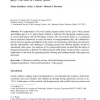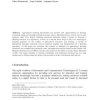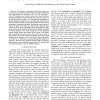288 search results - page 9 / 58 » Learning to Play Chess Using Temporal Differences |
121
Voted
CSCL
2010
14 years 9 months ago
2010
We implemented a five-week family program called Family Quest where parents and children ages 9 to 13 played Quest Atlantis, a multiuser 3D educational computer game, at a local af...
120
Voted
CG
2006
Springer
15 years 4 months ago
2006
Springer
Temporal difference (TD) learning has been used to learn strong evaluation functions in a variety of two-player games. TD-gammon illustrated how the combination of game tree search...
122
Voted
MTSR
2007
Springer
15 years 8 months ago
2007
Springer
Agricultural learning repositories can provide new opportunities for sharing, accessing, using and reusing learning resources online. Metadata plays a crucial role in such systems:...
104
click to vote
AAAI
2010
15 years 3 months ago
2010
The aim of General Game Playing (GGP) is to create intelligent agents that can automatically learn how to play many different games at an expert level without any human interventi...
118
click to vote
ICRA
2010
IEEE
15 years 27 days ago
2010
IEEE
Abstract— We present an integrated vision and robotic system that plays, and learns to play, simple physically-instantiated board games that are variants of TIC TAC TOE and HEXAP...



